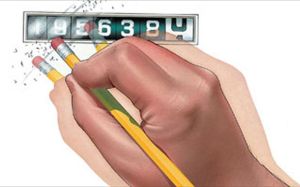 Odometer fraud is a problem that has plagued the automotive industry since its beginning and is a problem that won’t likely go away any time soon. With so many people buying and selling vehicles on sites like Craigslist and Facebook, becoming a victim of odometer fraud is a very likely possibility.
Odometer fraud is a problem that has plagued the automotive industry since its beginning and is a problem that won’t likely go away any time soon. With so many people buying and selling vehicles on sites like Craigslist and Facebook, becoming a victim of odometer fraud is a very likely possibility.
Odometer fraud occurs when a seller alters the odometer on the vehicle and/or documentation to make the mileage appear less than what it really is. This is illegal in every state and auto experts say it is relatively easy to do even when the odometer is digital. On the surface, odometer fraud affects the overall value of the vehicle because the seller can charge more for a vehicle with fewer miles. Dig a little deeper and realize that a vehicle that has a high amount of miles is more likely to be due for major repair work. That is a risk that some people are willing to take, but it is a risk that the consumer should be aware of.
The Federal Truth In Mileage Act (TIMA) requires sellers to provide actual, truthful odometer readings and to disclose any known inaccuracies. TIMA makes odometer fraud a felony and falsifying mileage or failing to disclose that an odometer has been altered can result in fines and/or imprisonment.
An invaluable tool when buying a pre-owned vehicle, whether at a dealership, a small business or from a friend or acquaintance is a CARFAX history report. While not completely infallible, CARFAX is one of most reliable tools in the industry. A CARFAX history report shows a potential buyer all of the details about the vehicle such as lemon history, total loss accident history, vehicle registration, title information etc.
Here are some tips for not falling victim to odometer fraud, as taken from the CARFAX website:
- Check that the car’s wear and tear is consistent with the odometer reading.
- Ask the seller for service records and note the mileage on them.
- Buy from a recommended dealership or trusted seller.
- Be wary of “too good to be true” deals or overly-aggressive sellers who want a quick sale.
- Get a CARFAX Vehicle History Report from the seller or at CARFAX.com.
- Have a trusted mechanic thoroughly inspect the vehicle and check its computer.
If you suspect that you have been a victim of odometer fraud, the next step is to report it to the authorities. In Texas, the Attorney General handles odometer fraud and you can report it here: http://www.oag.state.tx.us